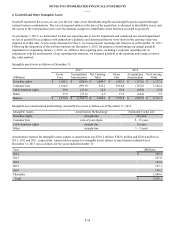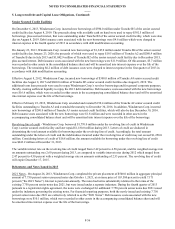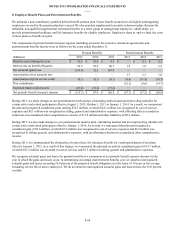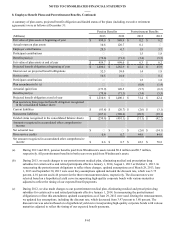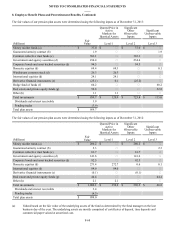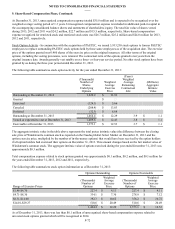Windstream 2013 Annual Report Download - page 199
Download and view the complete annual report
Please find page 199 of the 2013 Windstream annual report below. You can navigate through the pages in the report by either clicking on the pages listed below, or by using the keyword search tool below to find specific information within the annual report.
NOTES TO CONSOLIDATED FINANCIAL STATEMENTS
____
F-63
7. Fair Value Measurements:
Fair value of financial and non-financial assets and liabilities is defined as an exit price, representing the amount that would be
received to sell an asset or transfer a liability in an orderly transaction between market participants. Authoritative guidance
defines the following three tier hierarchy for assessing the inputs used in fair value measurements:
Level 1 – Quoted prices in active markets for identical assets or liabilities
Level 2 – Observable inputs other than quoted prices in active markets for identical assets or liabilities
Level 3 – Unobservable inputs
The highest priority is given to unadjusted quoted prices in active markets for identical assets or liabilities (level 1
measurement) and the lowest priority is given to unobservable inputs (level 3 measurement). Assets and liabilities are classified
in their entirety based on the lowest level of input that is significant to the fair value measurement. Our assessment of the
significance of a particular input to the fair value measurement requires judgment and may affect the valuation of fair value
assets and liabilities and their placement within the fair value hierarchy levels.
Our non-financial assets and liabilities, including property, plant and equipment, goodwill, intangible assets and asset
retirement obligations, are measured at fair value on a non-recurring basis. No event occurred during the year ended
December 31, 2013 requiring these non-financial assets and liabilities to be subsequently recognized at fair value.
Our financial instruments consist primarily of cash and cash equivalents, restricted cash, accounts receivable, income tax
receivable, accounts payable, long-term debt, and interest rate swaps. The carrying amount of cash, restricted cash, accounts
receivable, income tax receivable and accounts payable was estimated by management to approximate fair value due to the
relatively short period of time to maturity for those instruments. Cash equivalents, long-term debt and interest rate swaps are
measured at fair value on a recurring basis. Cash equivalents were not significant as of December 31, 2013 or 2012.
The fair values of interest rate swaps and long-term debt were determined using the following inputs at December 31:
(Millions) 2013 2012
Recorded at Fair Value in the Financial Statements:
Derivatives:
Interest rate swap liabilities - Level 2 $ (71.8) $ (120.2)
Not Recorded at Fair Value in the Financial Statements: (a)
Long-term debt, including current maturities - Level 1 $ 3,738.2 $ 3,273.5
Long-term debt, including current maturities - Level 2 5,270.0 6,140.5
$ 9,008.2 $ 9,414.0
(a) Recognized at carrying value of $8,707.2 million and $8,965.8 million in long-term debt, including current maturities,
in the accompanying consolidated balance sheets as of December 31, 2013 and 2012, respectively.
The fair values of interest rate swaps are determined based on the present value of expected future cash flows using observable,
quoted LIBOR swap rates for the full term of the swaps and also incorporate credit valuation adjustments to appropriately
reflect both Windstream Corp.'s own non-performance risk and non-performance risk of the respective counterparties. As of
December 31, 2013 and 2012, the fair values of the interest rate swaps were reduced by $2.6 million and $16.1 million,
respectively, to reflect non-performance risk.
The fair value of the corporate bonds was calculated based on quoted market prices of the specific issuances in an active market
when available. The fair value of the other debt obligations were estimated based on appropriate market interest rates applied to
the debt instruments. In calculating the fair value of the Windstream Holdings of the Midwest, Inc. notes, an appropriate market
price of similar instruments in an active market considering credit quality, non-performance risk and maturity of the instrument
was used.
We do not have any assets or liabilities measured at fair value using significant unobservable inputs (Level 3). We recognize
transfers between levels of the fair value hierarchy as of the end of the reporting period. There were no transfers within the fair
value hierarchy during the year ended December 31, 2013.



